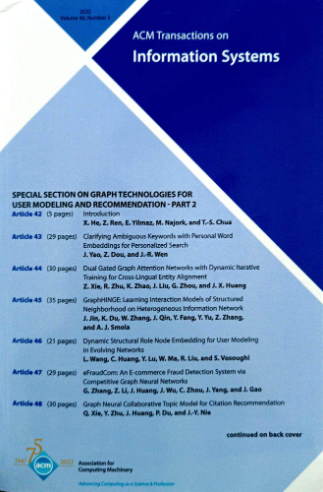信息搜索中的认知感受:一项脑电图研究
IF 9.1
2区 计算机科学
Q1 COMPUTER SCIENCE, INFORMATION SYSTEMS
引用次数: 0
摘要
与搜索者的知识差距相关的信息需求(IN)的实现和可变性是由感知到的知识异常状态(ASK)驱动的。“知感”(feeling -of- knowing, FOK)概念作为一种知识意识的内省感受,具有ASK状态的特征。从IR的角度来看,FOK作为触发IN的前提尚未被探索。在IR神经影像学研究的推动下,我们研究了与FOK相关的神经生理驱动因素,以提供证据证明FOK是in实现中的一种独特状态。我们使用脑电图来捕捉24名健康参与者执行文本问答IR场景的大脑活动。我们分析了三种知识状态对应的诱发神经模式:即(1)“我知道”,(2)“我知道”,(3)“我不知道”。我们的研究结果显示了不同的神经生理特征(N1, P2, N400, P6)在我们的三个水平的背景下处理的信息片段的响应。他们进一步揭示,与“我不知道”相关的大脑表现与“我不知道”相关的大脑表现没有显著差异,表明它们与认识知识差距有关,因此可以进一步告知不同层次的知识信息。本文章由计算机程序翻译,如有差异,请以英文原文为准。
Understanding Feeling-of-Knowing in Information Search: An EEG Study
The realisation and the variability of information needs (IN) with respect to a searcher’s gap in knowledge is driven by the perceived Anomalous State of Knowledge (ASK). The concept of Feeling-of-Knowing (FOK), as the introspective feeling of knowledge awareness, shares the characteristics of an ASK state. From an IR perspective, FOK as a premise to trigger IN is unexplored. Motivated by the neuroimaging studies in IR, we investigate the neurophysiological drivers associated with FOK, to provide evidence validating FOK as a distinctive state in IN realisation. We employ Electroencephalography to capture the brain activity of 24 healthy participants performing a textual Question Answering IR scenario. We analyse the evoked neural patterns corresponding to three states of knowledge: i.e. (1)“I know”, (2)“FOK”, (3)“I do not know”. Our findings show the distinct neurophysiological signatures (N1, P2, N400, P6) in response to information segments processed in the context of our three levels. They further reveal that the brain manifestation associated with “FOK” does not significantly differ from the ones associated with “I do not know”, indicating their association with recognition of a gap in knowledge and as such could further inform the IN formation on different levels of knowing.
求助全文
通过发布文献求助,成功后即可免费获取论文全文。
去求助
来源期刊

ACM Transactions on Information Systems
工程技术-计算机:信息系统
CiteScore
9.40
自引率
14.30%
发文量
165
审稿时长
>12 weeks
期刊介绍:
The ACM Transactions on Information Systems (TOIS) publishes papers on information retrieval (such as search engines, recommender systems) that contain:
new principled information retrieval models or algorithms with sound empirical validation;
observational, experimental and/or theoretical studies yielding new insights into information retrieval or information seeking;
accounts of applications of existing information retrieval techniques that shed light on the strengths and weaknesses of the techniques;
formalization of new information retrieval or information seeking tasks and of methods for evaluating the performance on those tasks;
development of content (text, image, speech, video, etc) analysis methods to support information retrieval and information seeking;
development of computational models of user information preferences and interaction behaviors;
creation and analysis of evaluation methodologies for information retrieval and information seeking; or
surveys of existing work that propose a significant synthesis.
The information retrieval scope of ACM Transactions on Information Systems (TOIS) appeals to industry practitioners for its wealth of creative ideas, and to academic researchers for its descriptions of their colleagues'' work.
 求助内容:
求助内容: 应助结果提醒方式:
应助结果提醒方式:


